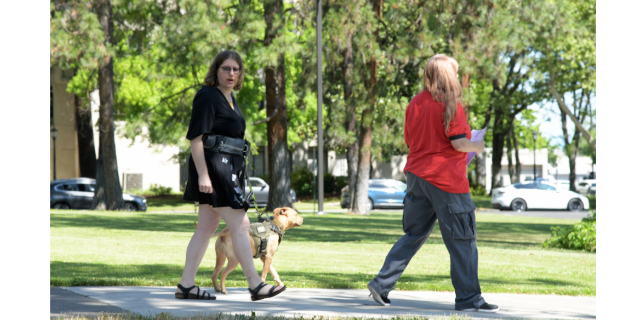OnTrack plans family treatment center to stop cycles of trauma and addiction
Published 6:00 am Sunday, July 16, 2023

- Cobblestone Village, background, will become the site of what OnTrack Rogue Valley has tentatively named its Family Treatment Campus.
When parents get treated for mental illness or substance use disorder, they’re not the only ones who need help.
A new project of OnTrack Rogue Valley seeks to treat the family, including the children, as a collective client.
Over the next few years, Cobblestone Village — a 2.7-acre campus in Medford with small businesses, salons and shops on North Riverside Avenue, south of Rogue Valley Mall — will become the site of what OnTrack has tentatively named its Family Treatment Campus.
Here, the agency plans to move and expand its residential treatment programs for parents and their children 5 and younger. The HOME (Mom’s) Program for mothers will expand from 24 beds to at least 35, the Dad’s Program from 10 beds to at least 16.
In the behavioral health care world, adults and children are usually treated by different providers in different settings, Sommer Wolcott, OnTrack’s executive director, said Wednesday at a roundtable discussion with project partners.
At the Cobblestone campus, family care will be located in one place.
Parents will have access to substance use and mental health treatment, psychiatric services and peer support.
Prenatal and postnatal care will be available for mothers.
Children will receive pediatric and psychiatric care, as well as early interventions and therapeutic care to counteract traumas.
OnTrack will focus on behavioral heath, while Oasis Center of the Rogue Valley — which will open a second site on campus — will attend to medical care.
Seth Lyon, chief operations officer at the Oregon Department of Human Services, said the project aligns with two department initiatives: the Building Well-Being Together Initiative, which elevates community partnerships, and the Child Welfare Division’s Vision for Transformation, which supports keeping families together rather than separating them.
“This brings it all together — that the family condition can be treated together — and that’s just so critical for our vision,” Lyon said at the roundtable.
Oftentimes, while parents receive drug and alcohol and mental health treatment, their children are placed in foster homes. The goal of OnTrack’s residential treatment programs for moms and dads is to reduce out-of-home placements — and to prevent their children from needing the same services.
Wolcott recently pulled up data on OnTrack’s residential clients. Eighty percent had a family history of mental illness and/or substance use, she said.
The children who don’t get treated early? “That’s who our clients are later,” she said.
OnTrack bought Cobblestone Village in spring 2022 for $3.1 million with a loan from People’s Bank and the profits from property sales, the Mail Tribune reported. An additional $12.5 million in grants and $50,000 in private donations have been designated for the project, Wolcott said in an email.
The agency plans to pursue funds through the Oregon Health Authority, opioid settlement dollars and federal sources, and to launch a capital campaign, she said.
Wolcott said OnTrack doesn’t know how much the project will cost. Much, she said, will depend on the design, which will also dictate how many beds will be added.
OnTrack is consulting with MASS (Model of Architecture Serving Society) Design Group, which recommended Portland-based Mahlum Architects. Both firms have experience with trauma-informed design.
Village spaces will become available for renovation as tenants’ leases expire. OnTrack is moving its family services administrative staff into temporary offices on campus. It is unknown whether new buildings will go up; the purchase of the property included an empty lot opposite Niantic Street.
Renovations are scheduled to begin next year.
The waitlist for OnTrack’s residential treatment programs, including the program in Grants Pass for single adults, has about 280 people on it, Wolcott said.
Dr. Kerri Hecox, medical director at both OnTrack and Oasis, said at the roundtable, “Many of the families that we see who are struggling with addiction are very socially isolated. They have very weak social supports.”
The Family Treatment Campus will see clients in various stages of recovery — from novice inpatients to seasoned outpatients.
“Our model is to keep patients for the long term, so when they come to us they stay with us, and so we’ve had patients that we’ve had since the very beginning,” Hecox said. “Those people will be on this campus modeling successful recovery to people who are newly coming into it and creating new social relationships that are going to be really supportive to people in the long term.”






